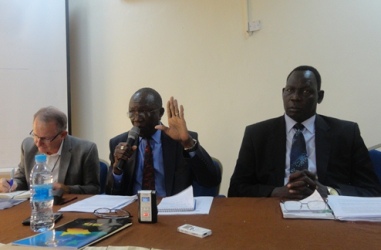S. Sudan conflict has promoted ethnic tensions, says official
September 28, 2014 (JUBA) – The South Sudanese conflict, now in its ninth month, has promoted tension, fear and mistrust among the Dinka and Nuer tribes, a senior official said last week.

“This explains why over 90,000 IDPs who live under protection of the UNMISS (UN Mission in South Sudan) are reluctant to go back to their homes. Often, their reluctance is justified by ethnic tension, mistrust and sense of fear for possible annihilation by the other tribe,” Korbandy said from Geneva.
“All these undermine the spirit of coexistence, peace and reconciling process,” he added.
However, South Sudanese president Salva Kiir told the 69th session of the UN general assembly in New York on Thursday that the conflict was purely a political crisis and not an ethnic struggle for power.
“My government has demonstrated its firm commitment to peace, has unreservedly honoured these agreements, and is continuing to negotiate in good faith to find a peaceful solution to the conflict,” said Kiir, who accused his former deputy, Riek Machar, of “impatience”.
Korbandy said the young nation has witnessed one of the worst internal displacements of its civilian population, notably in central Equatoria, Jonglei, Unity and Upper Nile states. To date over 90,000 people are living in IDP camps, the majority under the protection of the UN at various sites across the country.
“The conditions of the IDP camps have not been very good which needs humanitarian intervention,” he told the UNHRC meeting.
Nearly 1.5 million South Sudanese have been displaced due to the conflict as aid agencies warned of possible famine early next year.
The SSHRC chairperson, however, acknowledged efforts by government to promote and protect the rights of the country’s citizens, citing the formation of the investigation committee on human rights abuses headed the former chief justice of South Sudan.
“The committee is doing its work and soon may issue their findings in a form of a comprehensive report. The Commission is monitoring this process very closely,” said Korbandy.
Also in place, he said, was the formation of the crisis management committee by government to, among other functions, educate the people, that; the conflict did not target certain ethnic groups, but a national crisis requiring the unity of the South Sudanese to resolve it.
Meanwhile, Korbandy said SSHRC accepts and welcomes of the African Union Commission of Inquiry into the South Sudan conflict. The five-member body, which is headed by former Nigerian president Olusugen Obasanjo, has been tasked with investigating rights abuses and promoting the healing process.
(ST)
